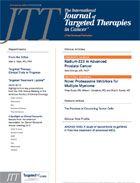Ibrutinib Well Tolerated and Effective in Phase II Trial in CLL
Ibrutinib was well tolerated and highly effective in eradicating tumor cells in both treatment-naïve and relapsed/refractory patients with chronic lymphocytic leukemia.
Adrian Wiestner, MD, PhD
Ibrutinib was well tolerated and highly effective in eradicating tumor cells in both treatment-naïve and relapsed/refractory patients with chronic lymphocytic leukemia (CLL) in an ongoing phase II study reported at the AACR 2013 annual meeting. The drug dramatically reduced disease burden in the lymph nodes, blood, spleen, and bone marrow, and responses were durable. Further, correlative studies confirmed on-target effects of ibrutinib, demonstrating sustained inhibition of B-cell receptor signaling and NF-kappa B signaling in both peripheral blood and lymph nodes.
“The degree of tumor reduction achieved by once-daily oral ibrutinib was impressive. Within just 2 months, we have seen patients with more than 90% reduction of lymph node tumor burden,” said lead author Adrian Wiestner, MD, PhD, head of the Lymphoid Malignancies Section in the Hematology Branch at the National Heart, Lung, and Blood Institute at the National Institutes of Health in Bethesda, Maryland.
Ibrutinib is a selective inhibitor of Bruton’s tyrosine kinase (BTK), an element of the B-cell receptor signaling pathway implicated in the evolution of CLL. This study confirms the activity of ibrutinib reported earlier this year at the American Society of Hematology meeting, particularly in patients with deletions of the17pchromosome, who are known to be difficult to treat, Wiestner said.
In the United States, the standard of care for treatment of CLL includes fludarabine, cyclophosphamide, and rituximab (FCR), which is highly effective, but less so in patients with CLL who have17pdeletions and who are elderly and frail. New treatments are needed for these subgroups, and ibrutinib represents a novel approach by inhibiting B-cell receptor signaling that controls cell proliferation, survival, and migration, thereby inducing apoptosis.
The phase II single-center trial included two cohorts of patients with CLL who required treatment: elderly patients over age 65 years (n=24; 8 treatment-naïve; 16 relapsed/refractory) and those with deletions of chromosome17p(n=29; 15 treatment- naïve; 14 relapsed/refractory).
All patients were treated with ibrutinib 420 mg per day in 28-day cycles, with the primary endpoint of response at 6 months. Treatment will be continued and response evaluated every 6 months.
Ibrutinib was safe and well tolerated. The most common adverse events were grades 1 and 2 diarrhea, rash, arthralgia, cramps, mouth sores, and fatigue. Hematologic adverse events were rare, and no treatment-related drug discontinuations were reported. Two deaths occurred, both unrelated to the study drug.
The drug achieved rapid disease control in all anatomic sites at 6 months; 95% of patients achieved at least a 73% reduction in lymph node disease burden, as well as a reduction in splenomegaly (median reduction, 55%). In 26 patients with an available bone marrow biopsy, ibrutinib reduced tumor infiltration by CLL cells by 82%. Absolute lymphocyte count was reduced by a median of 62%. According to standard response criteria for CLL, the rate of partial response was 52%. At 12 months, the estimated event-free survival was 94%.
Ibrutinib exhibited on-target effects by inhibiting B-cell receptor signaling in CLL cells in the lymph nodes and blood cells, Wiestner said. However, no correlation was observed between the degree of inhibition of B-cell receptor signaling and the degree of clinical response. “Ibrutinib exhibited rapid and sustained inhibition of B cell receptor signaling,” he said.
According to Wiestner, the durability of response is important. “Existing therapies often fail to eliminate cancer cells effectively in the blood, lymph nodes, spleen, and bone marrow. The drug warrants further study as a single agent. Targeted therapy is becoming a reality, and this new approach has the potential to greatly improve the lives of patients with CLL.”
